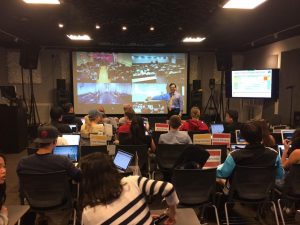Peer learning is the hallmark of the iPodia education model. Moving beyond those traditional e-learning approaches, the iPodia education model focuses on interactive and collaborative peer interactions to demonstrate the power of “i-learning.”
The model uses an interconnected platform, an inverted pedagogy, and an inclusive program to support peer-learning across borders.
- Interconnected Platform – iPodia uses the Internet to interconnect separate physical classrooms on remote campuses to establish an integrated “cyber-physical” learning environment for students to study together with distant peers as local classmates on their home campuses directly.
- Inverted Pedagogy – iPodia extends the inverted (i.e., flipped) classroom approach to support a new interactive peer-learning pedagogy, in which student feedback from pre-class content studies is used strategically to organize learning cohorts and provide contexts for peer interactions.
- Inclusive Program – iPodia leverages complementary instructional resources and diverse student backgrounds from participating institutions to develop and offer joint courses that can explore “learner diversities as learning resources” in its educational program.
In short, the hallmark of the iPodia model is its unique focus on borderless peer learning. Its interconnected platform links remote classrooms to eliminate the distance of peer interactions. Its inverted pedagogy exploits feedback from inverted learning to provide the context for peer interactions. Its inclusive program offers joint courses that comprise diverse students to enrich the experience of peer interactions. Rather than building walls of divisions, iPodia promotes “learning together for a better world” to create bridges of
understanding.
